Investec Cape Town Art Fair
Tofo Bardi
Layo Bright
Diana Ejaita
Ngozi-Omeje Ezema
Modupeola Fadugba
Ozioma Onuzulike
kó is pleased to participate at the Investec Cape Town Art Fair, February 21-23, 2025, at the Cape Town International Convention Centre (CTICC). kó presents six Nigerian artists working across painting, ceramics, glass, and mixed media.
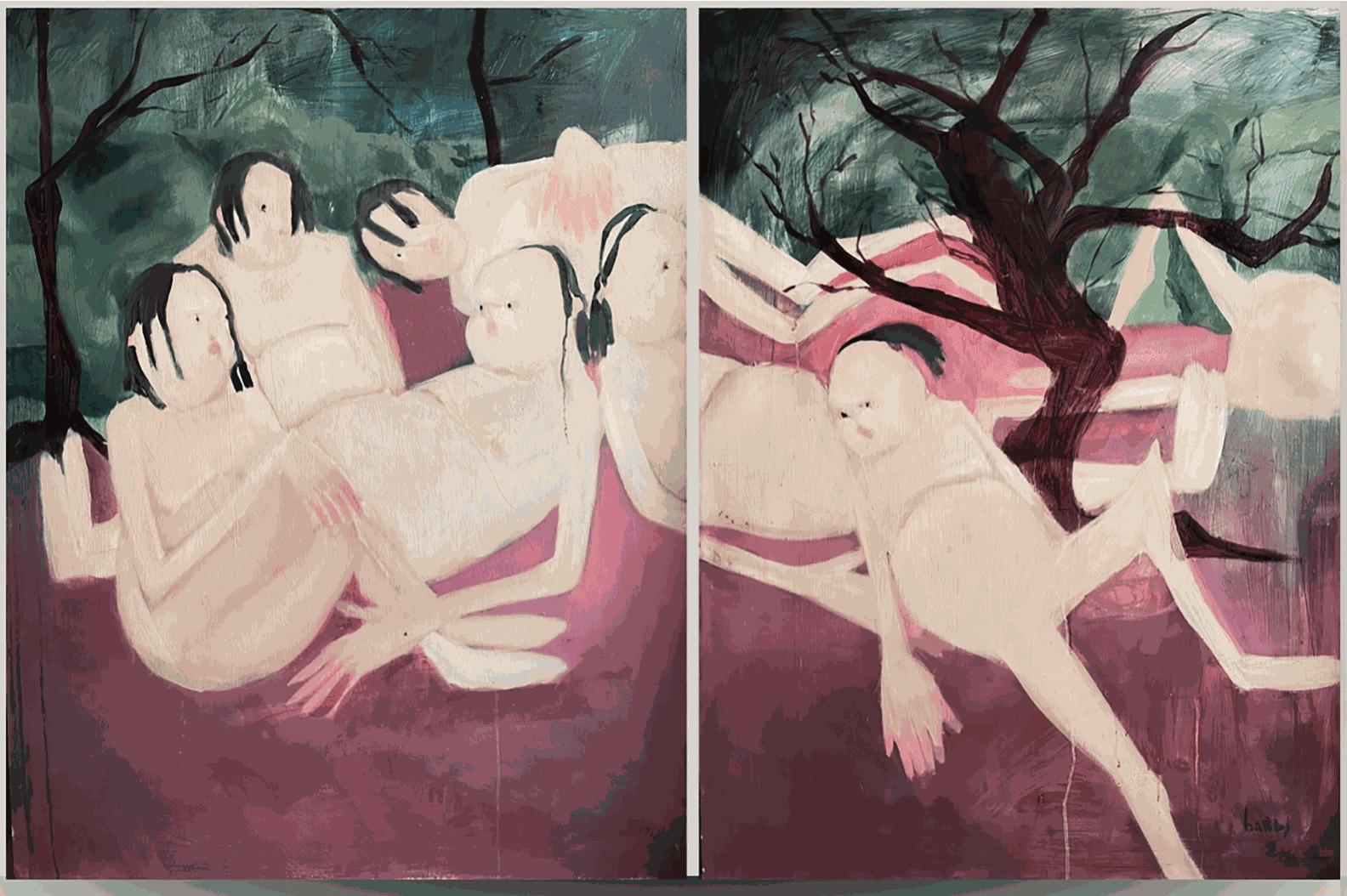
Tofo Bardi, Unending (Diptych) , 2024, oil on canvas, 183 x 122 cm.
Tofo Bardi (b. 2001, Benin City, Nigeria) draws inspiration from the liminal spaces of the human psyche and the raw, instinctual fear of the unknown. Her paintings are inhabited by phantasmal figures—spectral protagonists who haunt the canvas with an otherworldly presence.These apparitions are embodiments of the intricate, layered nature of the subconscious, alter-egos that linger at the edge of perception. Bardi’s paintings explore altered states of consciousness, rites of passage, and the ephemeral nature of intangible experiences. Deeply personal, her practice is shaped by her own encounters with fear and loss, translating these experiences into surreal visual narratives. These figures engage with one another in silent communion, existing in a dreamlike realm that evokes a sense of solitude and wonder.
Bardi is a graduate of the University of Benin, specialising in painting. In 2024, Bardi was included in the exhibition Self-Pleasure at Thomas Erben Gallery, New York, and was exhibited by kó at 1-54 New York and Untitled Art Fair Miami Beach. In 2023, Bardi was included in the exhibition Optics at kó in Lagos. She has participated in residencies at Longform (Michigan), the Young Contemporaries Bootcamp by Rele Arts Foundation, Nigeria, and the Arts in Medicine Fellowship. Bardi lives and works in Lagos.
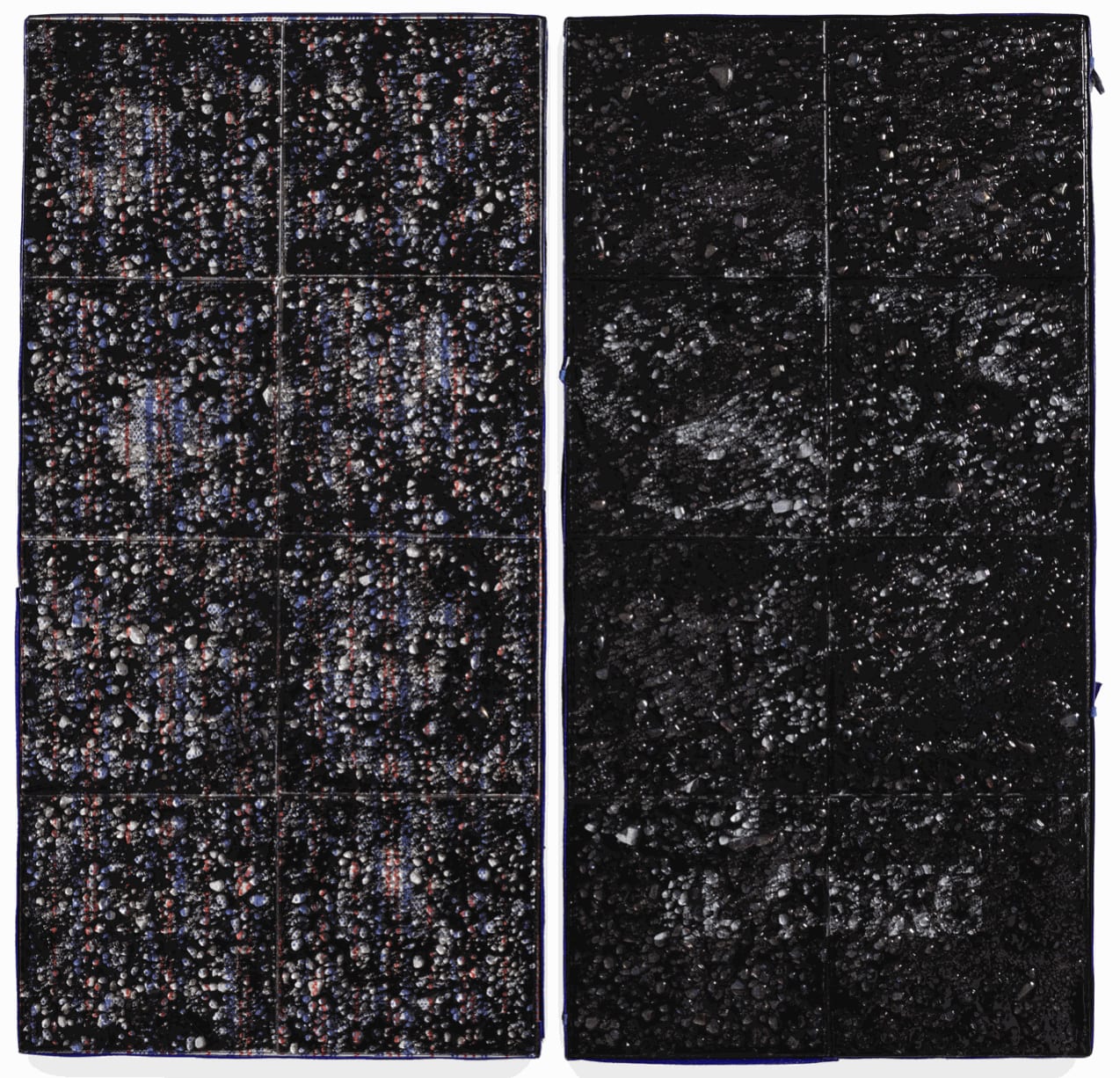
Layo Bright, Double Standard, 2022, Fused glass and Ghana-must-go bag on panel, 101.6 x 101.6 x 5 cm.
Layo Bright (b. 1991, Lagos, Nigeria) is a multidisciplinary artist whose practice explores themes of migration, inheritance, legacy and identity. Through a combination of materials such as glass, textiles, and found objects, she examines the intersections of personal and collective histories, often addressing the impact of displacement and suppressed narratives within global migration patterns. Her work critically engages with class structures and cultural heritage, reflecting on how histories are layered and rewritten over time. Bright’s use of materials, like Ghana-must-go bags—ubiquitous symbols of migration—alongside fused glass highlights the fragility and permanence of these experiences, challenging perceptions of movement, belonging, and exclusion. Bright’s hybrid portraits made from blown or kiln-formed glass are tributes to women in her life, representing memories of friends and family while also becoming intricately-decorated universal icons.
In 2024, Bright’s solo exhibition, Dawn and Dusk, was held at The Aldrich Contemporary Art Museum, Ridgefield, Connecticut. In 2025, Bright’s solo exhibition, Invasive Blooms, is currently held at Montclair State University Art Galleries, New Jersey. Other recent exhibitions include Rockhaven, moniquemeloche, Chicago, IL; The Alchemists, Johnson Lowe Gallery, Atlanta, GA; Undercurrents, Sean Kelly Gallery, New York, NY; Lubeznik Center for the Arts, Michigan City, IN; Bode Projects, Berlin, Germany; Phillips, New York, NY; among others. kó presented Bright’s work at Art X Lagos in Lagos, Nigeria in 2024. Bright received her LL. B (Hons.) from Babcock University, was called to the Nigerian Bar Association and received her MFA in Fine Art (Hons.) from the Parsons School of Design.
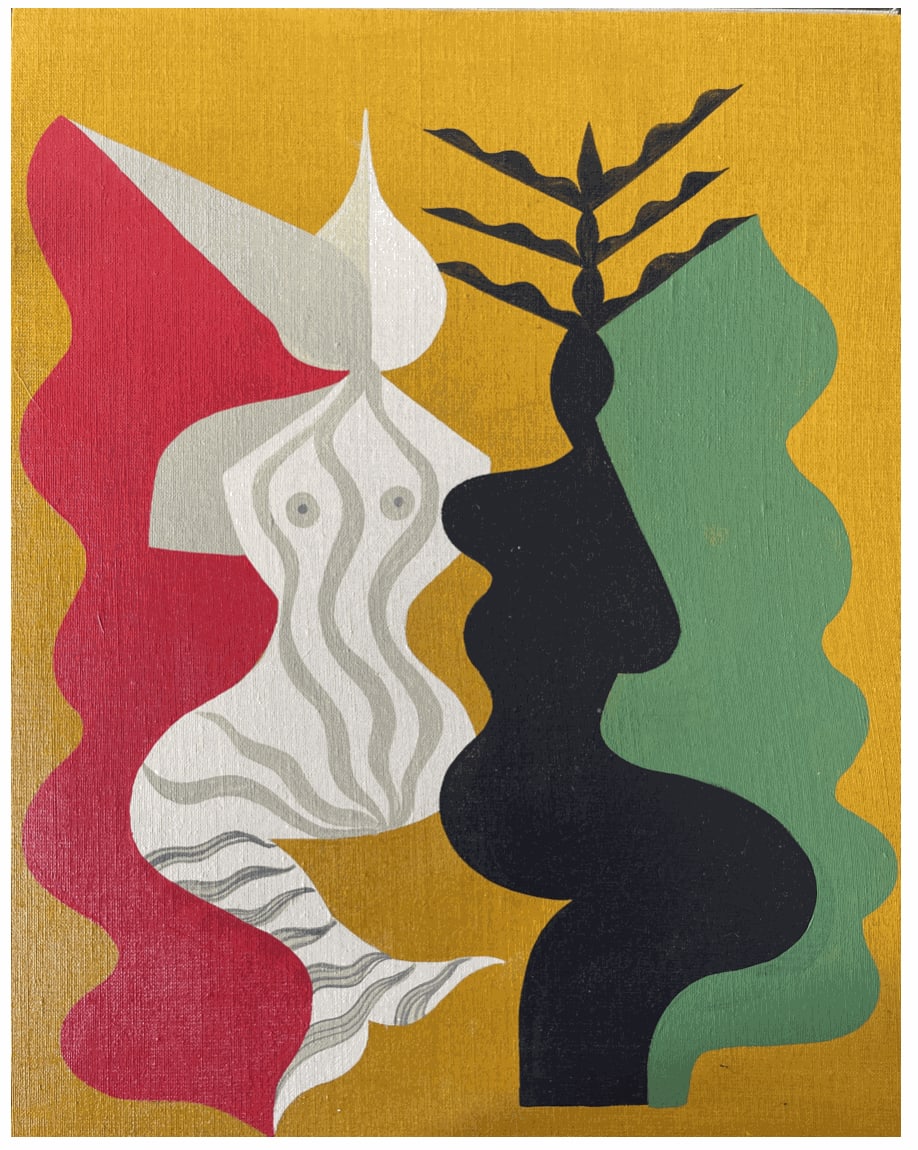
Diana Ejaita, O.O.D., prayer 2, 2025, acrylic on canvas, 41 x 50 cm.
Diana Ejaita (b. 1985, Cremona, Italy) examines symbolism, cultural memory, and the African diaspora experience, evoking a distinct visual vocabulary that intersects cultures. Drawing from West African literature, histories, and textile traditions, she blends abstract forms, geometric patterns, and storytelling. As a child of migration, Ejaita explores themes of belonging, resilience, and shared histories, using symbols as powerful messengers. Her illustrations feature bold contrasts and negative space, softened by intricate textures that evoke the strength and grace of femininity. For Ejaita, art is both a meditative ritual and a process of healing, reflecting her personal growth, including her journey into motherhood.
In the series Ona, Ejaita explores the layered nature of human experience, spirituality, and identity through intricate stratifications of forms, symbols, and space. The two large-scale canvases embody the concept of assembled experiences—a fusion of present and past lives, visual and verbal expressions, and spiritual fluctuations. The compositions present fluid, organic silhouettes emerging from densely layered, abstract elements, rendered in a muted palette of blues, reds, and blacks against expansive cream backgrounds. These fragmented yet interconnected forms resemble bodies, natural elements, and ritual objects, evoking the idea of living, moving shrines—sacred yet dynamic spaces of existence.
Objects of Desire (OOD 1–6) is an ongoing series of smaller paintings that emerged from Ejaita’s need to slow down the rapid production of imagery after years of working as an illustrator for major publications. These works reflect moments of stillness, healing, and restoration, exploring how desires and wishes form in quiet, reflective states. Ejaita approaches these compositions through layering and assemblage, creating what she describes as “nature morte” or visual prayers—collections of symbolic objects that embody longing, renewal, and transformation as sacred meditations. Recurring elements such as cow horns, plants, shells, the body, circles, crowns, and natural fibers serve as metaphors for ritual, strength, and interconnectedness. The waiting body itself becomes an architectural structure, a vessel of desires, reflecting both weight and aspiration.
Diana Ejaita was born in Cremona, Italy, from an Italian mother and a Nigerian father. She studied fine art in France and Germany, and is now based between Berlin and Lagos. Ejaita’s illustrations have been featured on nine covers of The New Yorker, including its 100th Anniversary issue, February 17-24, 2025. Her work has been featured in numerous international publications, including The New York Times, The New York Times Magazine, The Washington Post, The Boston Globe, The Economist, Vogue, Financial Times and Monopol. Ejaita was a fellow of Villa Romana Prize in 2023 and has published 8 children books (2021-2024) age 3-12. Her solo exhibition, Onajite, l’Attesa, was held at Galerie Wedding in Berlin in 2024. Other recent exhibitions include Afro Futures: Fashion – Hair – Design at Berlin’s Kunstgewerbemuseum (Museum of Decorative Arts); the Zurich Design Biennale; Concrete Limbo at Haus der Statistik (Berlin); the third edition of Miic (International Exhibition of Contemporary Illustration) in Galicia, Spain; and exhibitions at the University of Bielefeld (Germany), Kunst Gewerbe Museum (Berlin), and Appear (Hamburg). Her work has been commissioned by corporate bodies such as Google, Apple, Comme des Garcons, H&M, and Coca Cola Nigeria. Ejaita has completed artist residencies at Waaw in Saint-Louis, Senegal and the Arthouse Foundation in Lagos.
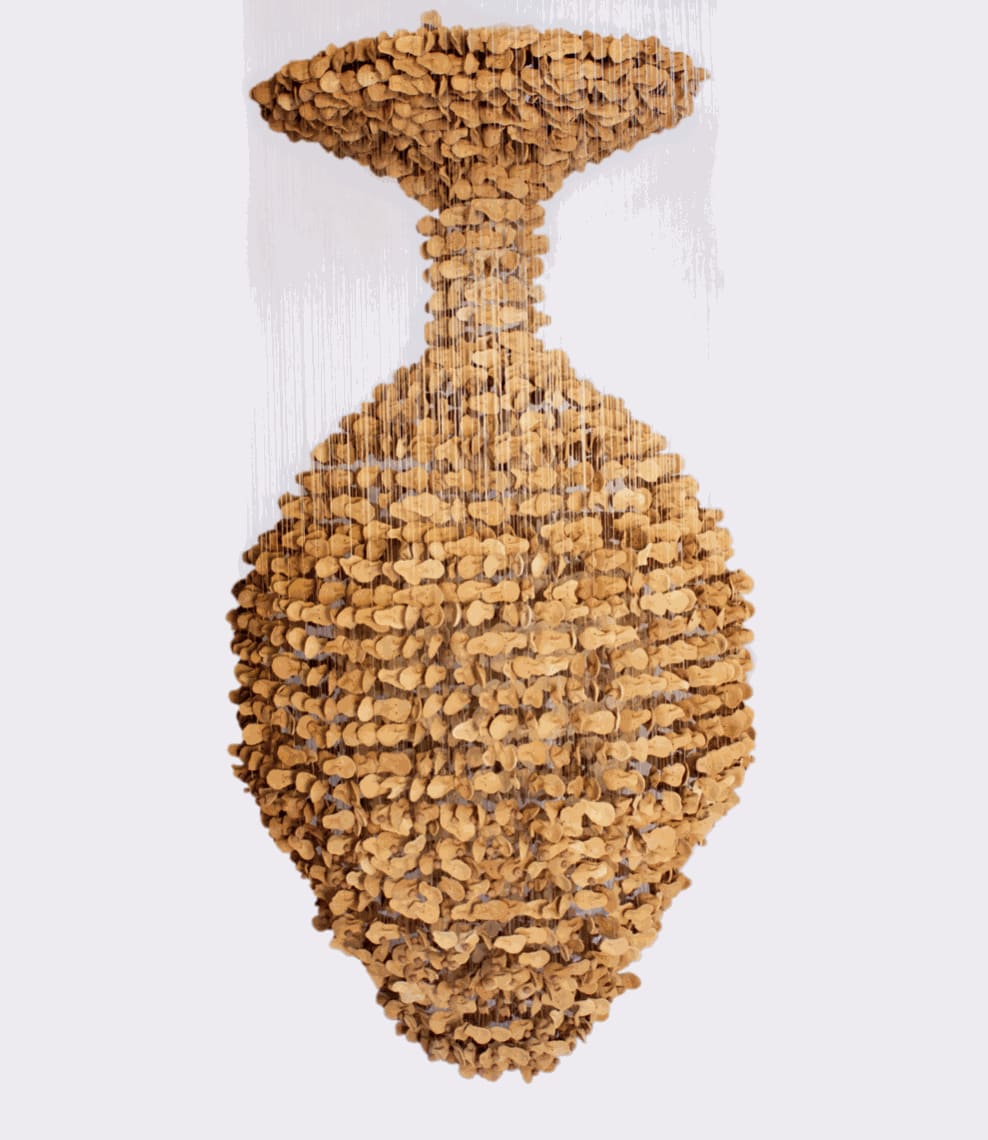
Ngozi-Omeje Ezema, The Sprout, 2025, Ceramics, plastics, metal, 90 x 90 x 180 cm.
Ngozi-Omeje Ezema (b. 1979, Nsukka, Nigeria) creates sculptural installations, made by suspending hundreds of terracotta pieces, that form the shapes of amorphous vessels. Ezema represents a new generation of contemporary Nigerian ceramists who infuse modernist sensibilities into an age-old traditional art form, radically challenging long-established notions that locate ceramics within the limiting frame of its utilitarian function. Her works explore the motifs of vases and leafs as expressive visual elements rich in affective metaphors, taking inspiration from the forms and materials of the natural environment. Using her personal experiences as a point of departure, her work addresses issues relating to identity, family and womanhood. The terracotta fragments are connected by translucent fishing wire and hung as free floating or wall-mounted works.
Ezema’s current exhibition, Boundless Vases, is held at Pinathotek der Modern in Munich, Germany, and at the exhibition Archives and Memories at Center for for Contemporary Art, Lagos. Ezema serves as a lecturer at the University of Nigeria, Nsukka, where she teaches ceramics. She participated in the First International Biennale in Centra China and Le Pinceau De L’Integration in Senegal during the Dakar Biennale in 2016. In 2019, she won the High Excellence Award at the Cheongju International Craft Biennale in South Korea. Ezema has participated in artist residencies with the Centre for Contemporary Art/ Trianglar Art Trust (Lagos), Goethe-Institut Nigeria (Nsukka), Sevshoon Art Centre (Seattle), Goethe Institute Ghana (Kumasi), and the Trianglar Art Trust (Jos). Ezema’s solo exhibition, Boundless Vases, was held at kó in Lagos, Nigeria in 2021. Her first solo exhibition, Connecting Deep, was held at Centre for Contemporary Art (CCA) Lagos in 2018. In 2021, Ezema was featured by kó as a Special Project at Abu Dhabi Art.
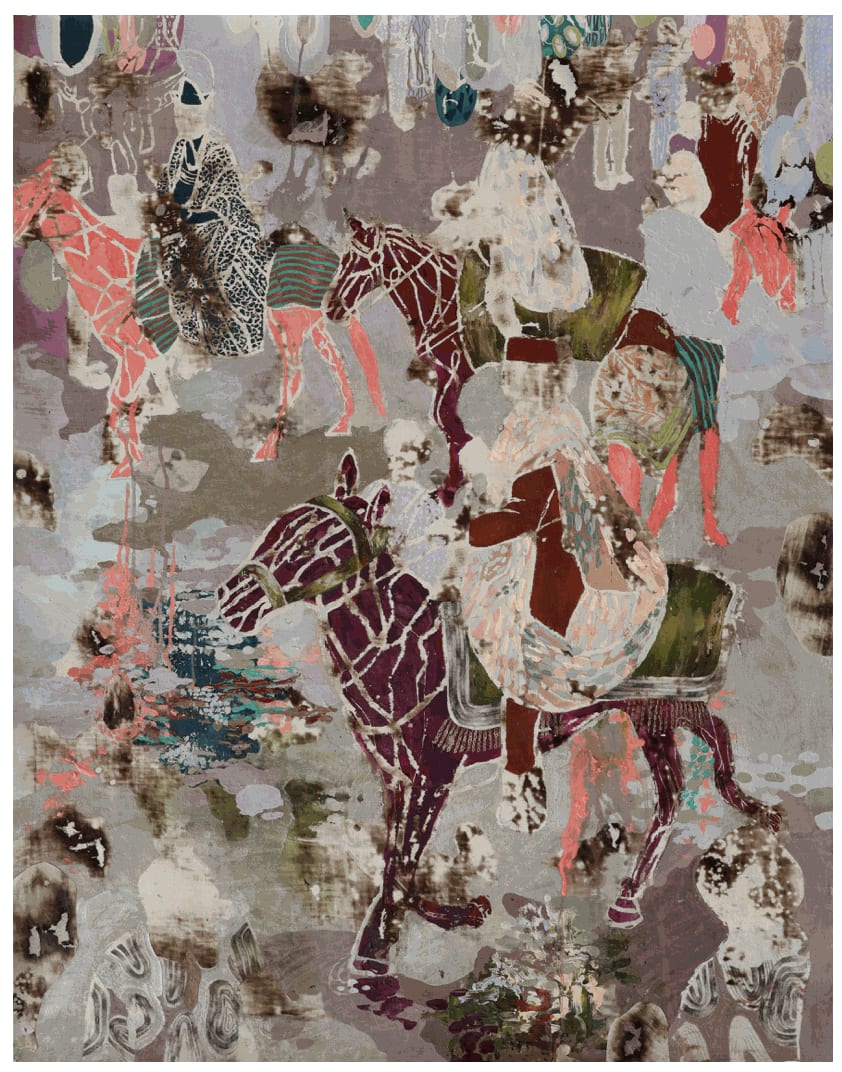
Modupeola Fadugba, Obátọ́lá, 2025, Acrylic, graphite, and acrylic ink on burned canvas, 111.8 x 87.6 cm.
Modupeola Fadugba (b. 1985, Lomé, Togo) explores cultural identity, social justice, game theory, and the art world within the socio-political landscape of Nigeria and the greater global economy. Originally trained in Chemical Engineering, the artist employs a unique technical skill-set to bring her surfaces to life, activating material science as a form of storytelling through the delicate burning of paper and incorporation of a variety of materials such as gold leaf, graphite, ink, acrylic, and oil. In her series Ojude Oba: The Chronicles, Fadugba unveils the rich narrative of the Ojude Oba festival, a celebration of Yoruba heritage that reflects deep communal ties and cultural pride. This piece honors the powerful bond between the Monarch and his people in Ijebuland, symbolizing identity, unity, and collective purpose. Inspired by the delicacy and detail of Japanese surimono prints, the artwork combines bold Nigerian symbolism with refined, layered textures. Traditional textiles and riders on majestic horses are framed by patches of coral, magenta, and lilac, while gold lines trace dynamic shapes, echoing the elegance and intricate compositions of this celebration. Visible pencil strokes, layered shading, and intentionally unfinished areas preserve the raw creative process, capturing the energy and evolving depth of this cultural tableau.
Modupeola Fadugba was born in Togo and grew up in England and the United States as a child of Nigerian diplomats. A self-taught artist, she holds a Bachelors Degree in Chemical Engineering from the University of Delaware, a Masters in Economics from the University of Delaware, and a Masters in Education from Harvard University. Fadugba’s work is currently featured in the exhibition Strategic Interplay: African Art and Imagery in Black and White at the Toledo Museum of Art, Ohio. She has participated in numerous group exhibitions including the Royal Academy Summer Exhibition in London, 2020 & 2017; A Ballad for Harlem at The Schomburg Center for Research in Black Culture in New York, 2019, and Afriques Capitales in Lille, France, 2017. Her work was selected for the 2016 Dakar Biennale, where she was awarded a Grand Prize from the Senegal Minister of Communication. Her project The People’s Algorithm included research as a Fellow at the Smithsonian, 2019-2020, and collaborative learning studies through a Museum Education Practicum with The Studio Museum in Harlem, 2021. The documentary following her series, Dreams from the Deep End, won an Emmy Award in 2022. Her work is included in the collections of the Smithsonian National Museum of African Art, Minneapolis Museum of Art, the University of Delaware, Chicago Booth School of Business, the Sindika Dokolo Foundation and the Liberian President, Ellen Johnson Sirleaf.

Ozioma Onuzulike, Jumper with Hansa Yellow Embroidery II, 2024, Earthenware and stoneware clays, glazes, recycled glasses and copper wire (23.6kg; 2,417 ceramic palm kernel shell beads), 135 x 116 x 10 cm.
Ozioma Onuzulike (b. 1972, Achi, Nigeria) creates large-scale ceramic works, resembling tapestries, that are meticulously crafted from thousands of ceramic palm kernel beads and natural palm kernel shells. He explores the aesthetic and symbolic nature of clay-working, adopting a laborious process to achieve unique colors and textures in the clay, oxides, and glazes. Each ceramic undergoes bisque-firing and is dipped into ash glazes before being adorned with recycled glass. The pieces are woven with copper wire and allude to the West African textile traditions of Akwete, Aso Oke, and Kente. These beads mimic the visual lightness of precious stones or ivories and also carry a tangible weight, much like Africa’s woven prestige textiles—dense with meaning, history, and identity.
Onuzulike’s works serve as metaphors for the historical and sociological roots of turmoil in Africa. Referencing their materiality, Onuzulike’s works are weighty embodiments of history, resilience, and transformation. The fusion of clay, oxides, glazes, and recycled glass creates a dynamic interplay of textures and colours, symbolising the power of collective action and the emergence of beauty from the struggle. His choice to incorporate recycled glass and copper wires extends the work’s conceptual depth into the realm of environmental sustainability. By repurposing discarded materials, these works contribute to global conversations on ecological consciousness, reinforcing the idea that transformation—whether social, cultural, or environmental—is both necessary and possible.
In 2024, Onuzulike was listed as a finalist for the the seventh edition of Loewe Foundation Craft Prize, which was exhibited at the Palais de Tokyo. He is a finalist for the Norval Sovereign African Art Prize 2025. Recent exhibitions include Recent Works at Marc Straus Gallery (NY); Free The Wind, The Spirit, and The Sun at Stephen Friedman Gallery (London); and When Hearts Beat with Lofty Dreams at Afrikaris (Paris). kó has presented his work at The Armory Show, EXPO Chicago, 1-54 New York, Art X Lagos, Abu Dhabi Art, and Untitled Miami. His work is in the permanent collection of the Museum of Anthropology and Archeology, University of Cambridge, Princeton University Art Museum, the Wellin Museum of Art at Hamilton College, Crocker Art Museum, Hudson Valley Museum of Contemporary Art, New York, and the Yemisi Shyllon Museum of Art, Lagos. Onuzulike is an art professor and the Director of the Institute of African Studies at the University of Nigeria, Nsukka. He graduated with First Class honors from the Department of Fine and Applied Arts, University of Nigeria, Nsukka.
The Investec Cape Town Art Fair VIP Preview takes place Thursday, February 20, 2025, by invitation. The fair is open to the public February 21-23, 2025, from 12-7 PM.
















